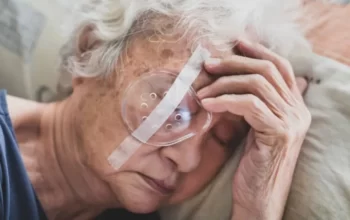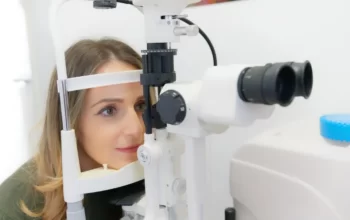
Once you are aware of the causes of myopia, it can be simple to stop it from getting worse. A distortion in the shape of the eyeball is what causes myopia, or nearsightedness as it is more commonly known. Images are projected on the retina’s surface, but not directly onto the retina because of this slight distortion. Myopic individuals likely have trouble seeing objects in the distance but do so well up close.
What Is Myopia?
As your child gets older, their myopia progresses. Since this condition progresses into adulthood and stabilizes there, your child’s myopia may continue to get worse for a while. High myopia may eventually develop as a result of this condition.
Nearsightedness, also known as myopia, is a common refractive error that affects about 25% of Americans. This mistake happens when incoming light cannot bend properly, causing vision to become blurry. Myopia causes distant images to appear blurry while up-close objects appear clear.
There are several myopia symptoms your child might experience. This condition typically manifests in early childhood.
What Causes Myopia?
Myopia development is heavily influenced by genetics. In comparison to a couple with just one myopic parent or no myopic parents at all, two nearsighted parents are more likely to give birth to a myopic child.
Myopia progresses for unknown reasons, but spending the majority of the day indoors and concentrating on close objects like screens and books may be risk factors. More investigation is required to ascertain whether the decrease in childhood time spent focusing on distant objects, such as a moving baseball or basketball net, maybe a factor in the rise in myopia cases globally.
How Can You Stop Myopia From Getting Worse?
Increased outdoor playtime in the sun is one of the best pieces of advice for parents of nearsighted kids. According to studies, kids who spent a lot of time outside in the sun developed myopia more slowly than kids who didn’t.
The World Health Organization recommends that children under the age of five spend no more than an hour a day in front of a screen and that infants under the age of one avoid screen time altogether. Children under the age of two should not use screens at all, according to the Children’s Eye Foundation. For children aged 2 to 5, they also advise limiting screen time to no more than 1-2 hours per day with frequent breaks.
With modern technology, there are many ways to stop myopia from getting worse. Astigmatism control refers to these therapies.
Controlling myopia focuses on stopping the condition’s progression. Myopia cannot be effectively controlled by single-vision lenses, but other therapies, such as:
- Multifocal contact lenses
- Atropine eye drops
- Orthokeratology (Ortho-k)

Spend More Time Outside
Increase your time spent outside!
It can be stressful for your eyes when you are forced to spend the entire day in front of the computer or the television.
When your eyes are constantly focused, it makes myopia worse, so it’s a good idea to let them rest a little in an unfocused setting like the great outdoors.
Limit Screen Time
Limiting your screen time can relieve stress and give your eyes a rest from working all day on a computer or playing video games.
Give yourself time to step away and relax your eyes during regular breaks. In order to avoid spending too much time staring at the screen, the 20-20-20 rule is excellent.
Use Protective Eyewear
When you decide to spend time outside, wear safety eyewear like sunglasses that block ultraviolet radiation. Although the sun is wonderful, you also need to protect your eyes.
Blue light-blocking eyewear can help reduce stress even when using a computer. When your kids are using digital devices, EyeZen lenses are a great option because they lessen the overall load on computers and other portable electronics.
Daily Eye Care Habits To Practise At Home
- When your child is reading, doing homework, or using an electronic device, make sure the room is well-lit.
- Encourage your kid to take breaks throughout the day. After 30 to 40 minutes of reading or homework, he or she should pause and let his or her eyes rest for at least 3 to 5 minutes. Simple eye relaxation techniques include gazing out the window at distant objects or simply closing your eyes for 30 seconds while gently pressing your palms over them.
- Computer and game time should be enjoyed in moderation, much like dessert. Aim to use electronic devices for no more than 30 to 45 minutes at a time in order to avoid prolonged exposure to the blue light they emit, which can harm the retina irreparably.
- Observe the following distances: any reading material should be held 30cm away from the eyes, computer screens should be at least 50cm away, and the television set should be at least 2 meters.
- To spend more time outside, nudge your kid. Natural light can release a chemical called dopamine in the eye that can stop myopia from developing. Outdoor pursuits are a wonderful way to strengthen family ties and enhance general health.
The Importance Of Myopia Management
In addition to impairing your child’s ability to see distant objects, myopia raises the possibility that they will experience these severe eye issues as adults:
- Glaucoma
- Cataracts
- Myopia macular degeneration
- Retinal detachment
The earlier your child starts managing their myopia, the better their chances are of slowing the condition’s progression and lowering their risk of developing eye conditions in later life.
How Can An Eye Doctor Who Manages Myopia Help?
Eye doctors who manage myopia do more than just recommend corrective lenses. Although there isn’t a real treatment for myopia, there are ways to slow its development.
current therapies consist of:
- Atropine eye drops
- Orthokeratology (“ortho-k”) gas permeable contact lenses
- Multifocal glasses/contact lenses
Following a thorough eye exam, doctors will determine the most appropriate treatment plan for your child’s eye health and lifestyle. Myopic children should have yearly eye exams to track any changes in their vision. It’s important to remember that not all optometrists offer myopia management.



